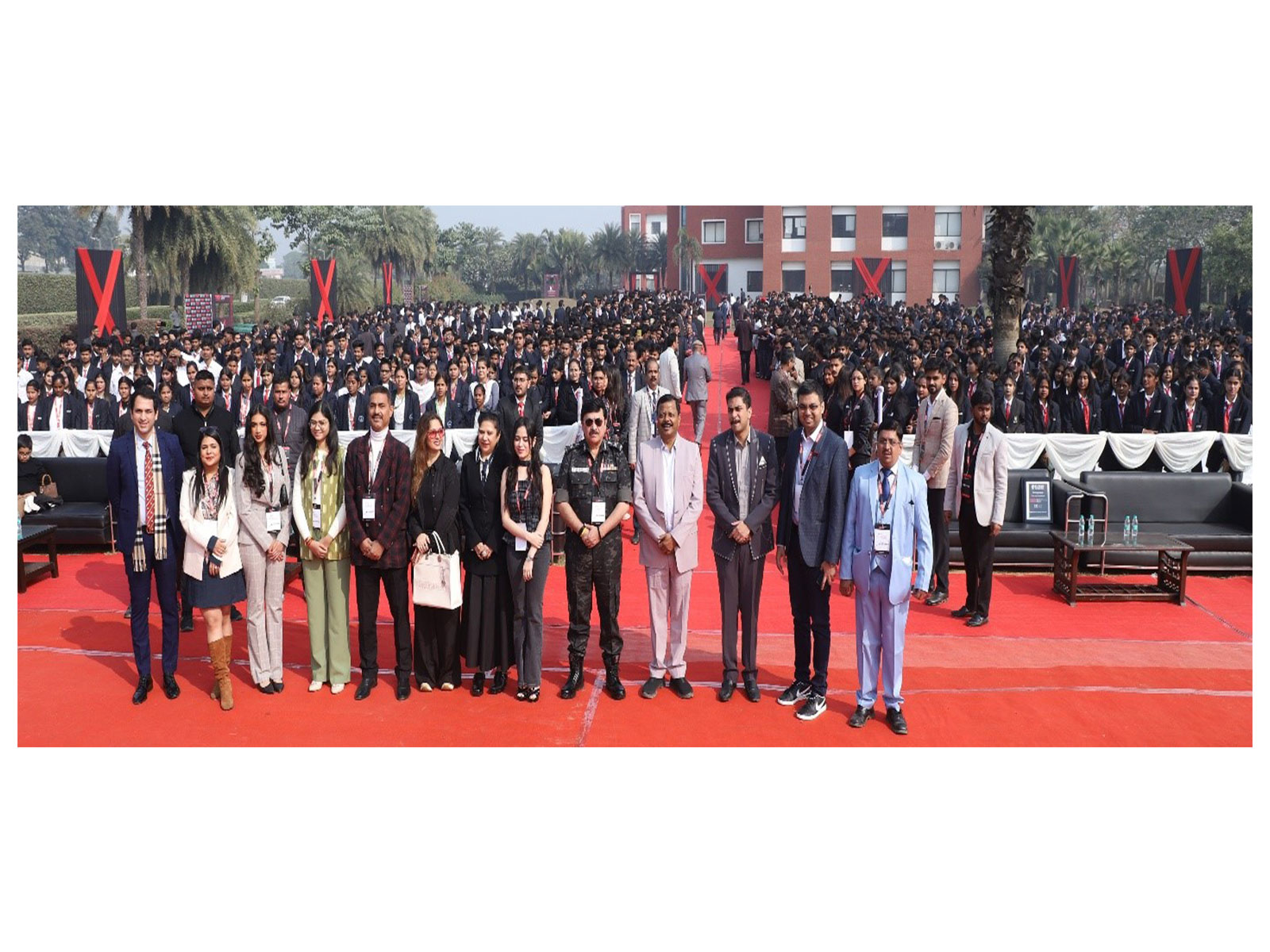PRNewswire
Chandigarh [India], December 6: Nature Conservancy India Solutions (NCIS) conducted a two-day workshop in Chandigarh on ‘Transitioning Towards Regenerative Foodscapes in Northwest India’ on December 4th and 5th, as part of its PRANA (Promoting Regenerative and No-Burn Agriculture) project. Chief Guest Ajit Balaji Joshi, Secretary, Department of Agriculture and Farmer Welfare, Government of Punjab, accompanied by Professor Adarsh Pal Vig, Chairman, Punjab Pollution Control Board, Shoikat Roy, Member Punjab Development Commission and the Managing Director of Nature Conservancy India Solutions, Dr. Anjali Acharya kicked off the two day event, which saw over eighty agriculture experts across policy, science and practice.
Ajit Balaji Joshi, Secretary, Department of Agriculture and Farmer Welfare, Government of Punjab as stated, “PRANA’s work in Punjab connects to the concept of ‘Pran’ which relates to oxygen. We are keen to increase agro-forestry and green cover in Punjab and it would be great to see such initiatives scale up. The good news is that crop residue burning count this year was more than 70% down as compared with last year, so there can be a lot of room for innovation in Punjab to improve farmer incomes and address environmental concerns. We need to work on maximizing farmer incomes through crop diversification and water savings. There can be ways of combining carbon credits with water credits and green credits and translate this into farmer incomes.”
Professor Adarsh Pal Vig, Chairman, Punjab Pollution Control Board shared hopeful evidence from Punjab’s crop residue management initiatives. “Ex-situ management of crop residue has doubled in Punjab since last year and the increase in industrial boilers (to 44 operational boilers with additional 31 boilers being installed) has significantly increased ex-situ management. Yet In-situ is the most natural way of managing crop residue and I call those farmers who have already been practising regenerative agriculture Nanak de Heere”.
Dr. Anjali Acharya, Managing Director, NCIS highlighted the need for collaborative efforts to support initiatives promoting economic viability, and offer alternatives to farmers in achieving long term environmental sustainability. She stated, “PRANA has been focused very much on crop residue management, but we are expanding into a regenerative foodscapes approach as we believe this is critically important. Thisworkshop provides a strong technical background to enable this discussion. It covers crop residue management, crop diversification, the Energy-Water-Food Nexus, how to bring the private sector in, how to bring about cross regional learning, and exploring different types of financing options but at the end of the day we are trying to support this ecosystems in four ways, Innovation, Institutional Supporting, Partnerships and Financing, which will be key to scaling up the transition to regenerative foodscapes that is required in Punjab. So we’re happy to bring the knowledge and information and expertise and evidence base from our different pilots in Punjab to support the Punjab government to meet its goals.”
Two policy briefs were launched at the workshop–Charting a Course for Effective Crop Residue Management in Punjab- Key Learnings from TNC’s PRANA Project and Punjab’s Energy-Water-Food Nexus: Exploration of Drivers and Practical Ways Out. These briefs provide evidence with clear recommendations to support sustainable agriculture transition in Punjab. The workshop felicitated regenerative farmers from various districts across Punjab, giving them a platform to share their experience with participants.
Shoikat Roy, Member, Punjab Development Commission stated, “The nexus of energy-water-agriculture-environment in Punjab and its interrelated crises of paddy over-production, stubble burning, and groundwater depletion is well understood. However, there are also solutions to such issues, some of which the Punjab Development Commission is spearheading. One solution to the groundwater/power problem is decentralized solarization coupled with replacement of existing pumps with energy efficient pumps and net billing to incentivize the farmer to save water/power. In this manner, the farmer continues to get free power while earning additional income and reducing water consumption and the state’s subsidy bill as well. PDC has also recommended a strong continued focus on cost-efficient ex-situ solutions such as CBG and industrial boilers along with incentivizing in-situ management for stubble burning. Lastly, maize-to-ethanol holds huge promise for paddy diversification in the coming years. This will require the active facilitation by Govt. of Punjab, a strong supportive role of Govt. of India independent of politics, and also cooperation and partnership of the wide variety of research and civil society stakeholders here – so that we can further scale up this work together” .
The sessions highlighted the interdependence of water, energy, and food production which demands a closer and structured approach to optimising the benefits for farmers while managing the available resources effectively. The participants discussed strengthening canal networks and water saving initiatives like Alternative Wetting and
Shoikat Roy, Member, Punjab Development Commission stated, “The nexus of energy-water-agriculture-environment in Punjab and its interrelated crises of paddy over-production, stubble burning, and groundwater depletion is well understood. However, there are also solutions to such issues, some of which the Punjab Development Commission is spearheading. One solution to the groundwater/power problem is decentralized solarization coupled with replacement of existing pumps with energy efficient pumps and net billing to incentivize the farmer to save water/power. In this manner, the farmer continues to get free power while earning additional income and reducing water consumption and the state’s subsidy bill as well. PDC has also recommended a strong continued focus on cost-efficient ex-situ solutions such as CBG and industrial boilers along with incentivizing in-situ management for stubble burning. Lastly, maize-to-ethanol holds huge promise for paddy diversification in the coming years. This will require the active facilitation by Govt. of Punjab, a strong supportive role of Govt. of India independent of politics, and also cooperation and partnership of the wide variety of research and civil society stakeholders here – so that we can further scale up this work together”.
The sessions highlighted the interdependence of water, energy, and food production which demands a closer and structured approach to optimising the benefits for farmers while managing the available resources effectively. The participants discussed strengthening canal networks and water saving initiatives like Alternative Wetting and Drying (AWD) that save 30% water use for irrigation along with 48% reduction in methane emissions without affecting the yields, according to International Rice Research Institution (IRRI).
Ensuring that the private sector also plays a key role in scaling regenerative agriculture, market-driven solutions such as carbon credits and the need for investments and policy reforms to encourage farmers toward regenerative practices were also discussed.
Addressing the interconnected agricultural challenges in Punjab to help farmers adapt to shifting climatic conditions requires Sustainable management of paddy residue, crop diversification, solarization, agro forestry and innovative financial mechanisms to build farmer incentives. Regenerative Foodscapes can be built through partnerships with projects such as PRANA which provide ground based evidence for enabling climate resilience in Punjab. PRANA has been working with an evidence-based approach working closely with its implementation partners who include Reviving Green Revolution Cell, Manav Vikas Sansthan (MVS), KPMG, Vertiver, and FarmSio. Expert discussions at the workshop have underscored the urgency of aligning policy, innovation and financial support to create an enabling environment that sets Punjab on the path to climate resilience and demonstrates solutions that can be scaled up across Northwest India.
About TNC’s PRANA project has engaged over 80,000 farmers across 6,200 villages in Punjab since 2021 for promoting Crop Residue Management (CRM) and regenerative agricultural practices. The Nature Conservancy (TNC) plans to adopt a regenerative Foodscape Approach. This approach will integrate regenerative farming, the Water-Energy-Food (WEF) Nexus, and community involvement to address Punjab’s agricultural and environmental challenges.
Photo: https://mma.prnewswire.com/media/2574277/Building_Regenerative_Foodscapes.jpg
(ADVERTORIAL DISCLAIMER: The above press release has been provided by PRNewswire. ANI will not be responsible in any way for the content of the same)
Disclaimer: This story is auto-generated from a syndicated feed of ANI; only the image & headline may have been reworked by News Services Division of World News Network Inc Ltd and Palghar News and Pune News and World News
HINDI, MARATHI, GUJARATI, TAMIL, TELUGU, BENGALI, KANNADA, ORIYA, PUNJABI, URDU, MALAYALAM
For more details and packages
















